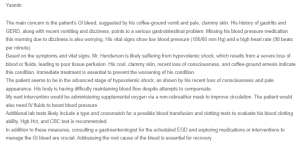Response – Management of Hypovolemic Shock in GI Bleed
Reply to Yasmin
Hello Yasmin,
Great post! Your diagnosis of Mr Henderson as a hypovolemic shock is correct, especially in the light of coffee-ground emesis, pale, clammy skin, and the recent history of a spell of unconsciousness. I support your choice to organize the application of oxygen through a non-rebreather mask and initiate IV fluid therapy in order to maintain his hemodynamics (Taghavi et al., 2023). These measures are important in hypovolemic shock, as they help replenish blood volume and redisperse throughout the body. Also, I would like to stress the need to give isotonic crystalloids, which include normal saline, rapidly, which is usually given early in such conditions.
Additionally, a more specific analysis of the early initiation of vasopressor support is recommended if patients have not responded positively to fluid challenge, pointing to an aggressive approach to their mediators. The recommendation to seek advice from the gastroenterologist to perform an urgent UGI endoscopy is also prescribed because only after determining the source of the GI bleed, leading to deterioration of the patient’s condition, it is possible to take the necessary measures (Jung & Moon, 2019).
References
Jung, K., & Moon, W. (2019). Role of endoscopy in acute gastrointestinal bleeding in real clinical practice: An evidence-based review. World Journal of Gastrointestinal Endoscopy, 11(2), 68–83. https://doi.org/10.4253/wjge.v11.i2.68
Taghavi, S., Askari, R., & Nassar, A. (2023, June 5). Hypovolemic Shock. National Library of Medicine; StatPearls Publishing. https://www.ncbi.nlm.nih.gov/books/NBK513297/
Reply to Kadija
Hello Kadija,
Great post! Recognition of Mr. Henderson’s deteriorating condition due to hypovolemic shock is well-founded, especially considering the presenting symptoms. Administering IV fluids is one of the essential interventions in hypovolemic shock since it helps replace the circulating volume. For this reason, when a patient is ordered for endoscopy, it is advisable to think about the early requests for blood products and specially packed red cells, specifically if there are symptoms pointing towards anemia or ongoing bleeding (Hooper & Armstrong, 2022). It may be essential in helping to manage the condition and then subjecting the patient to other diagnostic procedures.
Reference to a fecal occult blood test is beneficial in the diagnostic evaluation when there is a suspicion of a lower GI bleed. Nevertheless, it is recommended to call for an upper GI endoscopy without delay since there are indicators of an upper GI source, the management of which might be fatal if done later. They also may require early involvement of the surgical team depending on the results of the endoscopy (Kaur & Adamski, 2020).
References
Hooper, N., & Armstrong, T. (2022). Hemorrhagic Shock. National Library of Medicine; StatPearls Publishing. https://www.ncbi.nlm.nih.gov/books/NBK470382/
Kaur, K., & Adamski, J. J. (2020). Faecal Occult Blood Test (Hemoccult). PubMed; StatPearls Publishing. https://www.ncbi.nlm.nih.gov/books/NBK537138/
ORDER A PLAGIARISM-FREE PAPER HERE
We’ll write everything from scratch
Question
Yasmin
The main concern is the patient’s GI bleed, suggested by his coffee-ground vomit and pale, clammy skin. His history of gastritis and GERD, along with recent vomiting and dizziness, points to a serious gastrointestinal problem. Missing his blood pressure medication this morning due to dizziness is also worrying. His vital signs show low blood pressure (106/60 mm Hg) and a high heart rate (98 beats per minute).

Role of the Nurse Leader and Manager in Regulatory and Practice Standards
Based on the symptoms and vital signs, Mr. Henderson is likely suffering from hypovolemic shock, which results from a severe loss of blood or fluids, leading to poor tissue perfusion. His cool, clammy skin, recent loss of consciousness, and coffee-ground emesis indicate this condition. Immediate treatment is essential to prevent the worsening of his condition.
The patient seems to be in the advanced stage of hypovolemic shock, as shown by his recent loss of consciousness and pale appearance. His body is having difficulty maintaining blood flow despite attempts to compensate.
My next intervention would be administering supplemental oxygen via a non-rebreather mask to improve circulation. The patient would also need IV fluids to boost blood pressure.
Additional lab tests likely include a type and crossmatch for a possible blood transfusion and clotting tests to evaluate his blood clotting ability. Hgb.Hct, and CBC test is recommended.
In addition to these measures, consulting a gastroenterologist for the scheduled EGD and exploring medications or interventions to manage the GI bleed are crucial. Addressing the root cause of the bleed is essential for recovery.
Kadija
Two concerns I harbored while treating Mr. Henderson included possible internal bleeding based on his symptoms and possible hypovolemic shock as a result of it.
I believe that the patient is experiencing hypovolemic shock because of a large amount of blood loss. He is displaying symptoms such as decreased blood pressure, cool/ clammy skin, and dizziness.
Mr. Henderson is in the third stage of hypovolemic shock, and he is deteriorating. This is evidenced by his respiratory rate, heart rate, and blood pressure as we are still unsure of how much blood loss has occurred.
My first nursing intervention would be administering IV fluids to return to a state of equilibrium. Although the hypovolemic shock is likely being caused by an internal bleed it is necessary as a nurse to first administer the fluid bolus.
An additional lab test that can be used to determine whether a patient is experiencing internal bleeding is a fecal occult blood test, which searches for evidence of blood in a stool sample. The patient could also receive a chest CT or X-Ray
When treating a patient that is in an urgent stage such as this, it is important to seek aid while caring for them. Mr. Hendersons blood pressure warrants the use of a rapid response. it is also crucial to advocate for your patients when they are unable to communicate effectively themselves.
References:
1) Professional, C. C. M. (n.d.). Hypovolemic shock. Cleveland Clinic. https://my.clevelandclinic.org/health/diseases/22795-hypovolemic-shock
2) Professional, C. C. M. (n.d.). Gastrointestinal (GI) bleeding. Cleveland Clinic.

